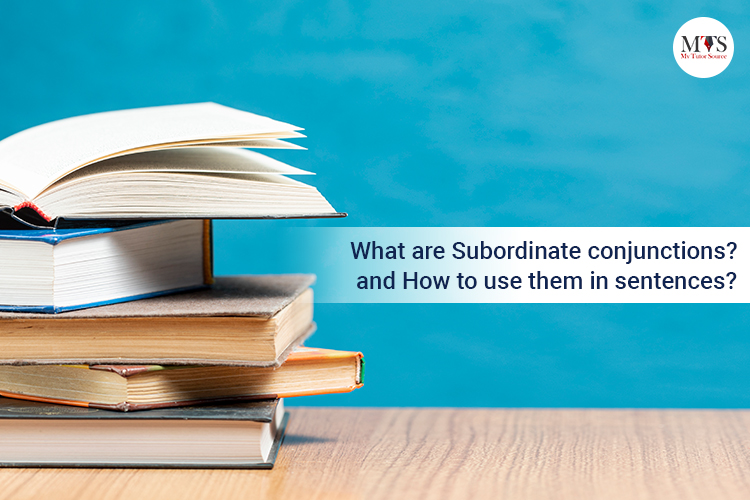Since English is one of the most spoken languages globally, the importance of learning this language keeps increasing with time. However, English grammar can be a tough subject for many students out there. Therefore, we are going to discuss one of the most important topics in English grammar. We are going to talk about Conjunctions, types of conjunctions, subordinating conjunctions, coordinating conjunctions, and correlative conjunctions. However, this article is more focused on subordinating conjunctions.
CONJUNCTION:
Junction means a place that connects two places. A conjunction is a word that joins two words, phrases, or clauses together. One can use a conjunction to link words, phrases, and clauses. For example,
- Joe and Zoe are best friends.
- My car key is on the bed or in the drawer.
- Although she worked hard, she could not get the promotion.
By looking at these examples, one can notice how the conjunction is not always placed between words as it can come at the beginning of the sentence as well.
TYPES OF CONJUNCTIONS:
There are three types of conjunctions:
- Coordinating Conjunctions
- Subordinating Conjunctions
- Correlative Conjunctions
To understand these conjunctions especially subordinating conjunctions, we need to know what one means by clauses and the difference between the dependent and independent clauses.
CLAUSE:
A Clause means a sentence having both SUBJECT and VERB. For example:
- He went to the park.
- I made pasta.
A fun fact about clauses is that All Sentences are clauses; however, all clauses are not sentences. The two types of clauses we are going to discuss are Dependent clauses and Independent clauses.
Dependent clauses are the clauses that cannot stand on their own and provide extra information that might not be necessary. For instance, because he was curious, this example is telling us that he was curious but did not tell us the rest of the context. Why was he curious? Yeah, he was curious, so what? A dependent clause will always make you ask this question “Yeah, So What about it?” A dependent clause leans against an independent clause.
The clauses that can stand on their own and always makes sense. For instance, Jessica wants to buy a car. As the name suggests, the independent clauses do not lean on the dependent clause to explain its meaning as the sentence is self-explanatory.
Let’s now define coordinating conjunctions and correlative conjunctions first.
- COORDINATING CONJUNCTIONS:
Coordinating conjunctions are the conjunctions, which unite the independent clauses together. For instance, Nick and Winston are best friends. She was coming to the party, but her sister took the car. In this example, and, but are the coordinating conjunctions. If you want to learn all the coordinating conjunctions, we have a solution for you, and that is FANBOYS.
- CORRELATIVE CONJUNCTIONS:
Correlative conjunctions are the conjunctions that are related together in some way, like a matched pair, as when you use one, it’s the time to use one. They always have to work in pairs to make sense of the sentence. For instance, Either you are doing the project, or I am. I like neither soft drinks nor shakes. Here, either/or and neither/nor are correlative conjunctions and work in a matching pair as a sentence with only “Either” would not be complete without “Or” as using correlative conjunctions implies that they are making a choice. Some of the correlative conjunctions are as follows:
- Either / or
- Neither / nor
- Not only / but also
- Both / and
- Hardly / when
- Such / that
- Whether / or
- If / then
Now, let us discuss the main topic, “Subordinating Conjunctions,” in detail.
- SUBORDINATING CONJUNCTIONS:
Subordinating conjunctions are the conjunctions that unite both the independent clause and dependent clause together. For Instance:
We carried our umbrellas since it was raining.
In this example, we can see that “We carried our umbrellas” and “It was raining” are two independent sentences; however, “since” is the subordinating conjunction. In the example, the Green part is the independent clause as we carried our umbrellas gives full meaning to the sentence. The yellow part is the dependent clause; however, it has a subject and its own predicate that in this case is “it was raining,” but it depends on the independent clause for its whole meaning.
Now we are going talk about the most used subordinating conjunctions and under what conditions:
Place/Time
| After, Before, When, Since, Till, Until, As soon as, While, Once, Whenever, Where, Wherever
|
| Reason/Cause | As, Because, Since, So that, Now that, As if, As thought, In order that
|
Contrast/ Concession
| Though, Although, Even though, Whereas
|
Comparison/Condition
| While, If, Unless, Than, Whether, As much as, Whereas
|
Feeling confused about how to use them? We got you fam, we are going to list the examples of subordinating conjunctions in sentences:
- Since we’ve got a few minutes to wait for the bus, let’s have a cup of tea.
- I love Picasso’s art because he uses color so brilliantly.
- Though it was cloudy, we went to school.
- He owns a small phone even though he is a rich man.
- She will promptly arrive at 7 PM unless her flight is delayed.
- I was listening to music until my teacher arrived.
- Once you see him, you will recognize him.
- Did my friend say something before he left?
He cannot get a job while being so sick.
Find Top Tutors in Your Area
Find A Tutor

